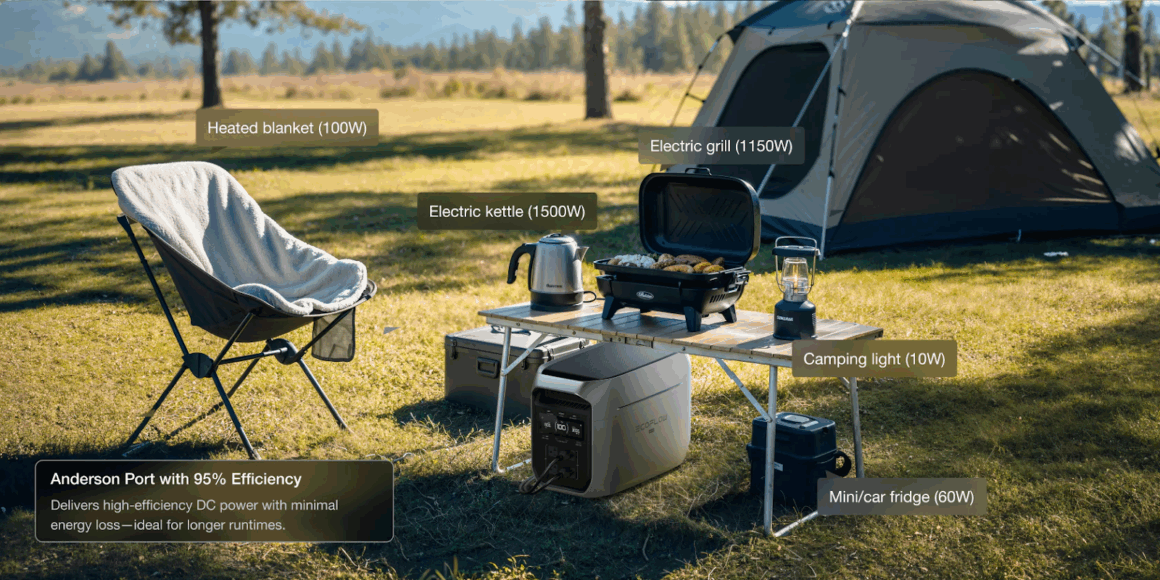Yes, solar generators are worth it for home backup power if you want a clean, quiet, and low-maintenance way to keep essential devices running during outages. They provide renewable energy independence without the fuel, noise, or fumes that come with traditional generators. Let’s explore how they work, their benefits and limits, and when a whole-home power system might be a smarter long-term upgrade.
What Is a Solar Generator
A solar generator is a portable energy system that uses sunlight to generate and store electricity. It typically includes solar panels, a charge controller, a battery, and an inverter. The panels collect energy from the sun, the controller manages power flow, the battery stores electricity, and the inverter converts it into usable AC power.
Unlike gas-powered models, solar generators operate silently, require little maintenance, and can be safely used indoors or outdoors. They are a compact, eco-friendly way to keep essential devices powered when the grid goes down.
Why Homeowners Are Turning to Solar Generators
Eco-Friendly and Renewable
Solar generators rely entirely on sunlight, producing zero emissions and no noise. They help reduce carbon footprints while promoting long-term sustainability—a key reason why many homeowners are replacing fuel-based generators with solar alternatives.
Cost-Effective Over Time
While the upfront cost may be higher, solar energy itself is free. Once purchased, there are no ongoing fuel or maintenance expenses. Over the years, this translates into substantial savings, especially for homes that experience frequent blackouts.
Quiet, Safe, and Hassle-Free
No gasoline. No exhaust fumes. No risk of carbon monoxide poisoning. Solar generators are simple to operate and recharge automatically during the day. They’re safe for apartments, condos, and indoor spaces where fuel-based units aren’t practical.
Flexible and Portable
Solar generators aren’t fixed to one location. You can move them between rooms, take them camping, or use them in RVs. For families that value mobility, this versatility adds extra convenience.
How Solar Generators Compare to Gas Generators
| Feature | Solar Generator | Gas Generator |
| Power Source | Sunlight (free) | Gasoline or propane |
| Emissions | None | Carbon monoxide and fumes |
| Noise Level | Silent | Loud |
| Maintenance | Minimal | Requires oil and fuel management |
| Operating Cost | Near zero | High (fuel required) |
| Indoor Use | Safe | Unsafe |
| Startup | Instant | Requires setup and refueling |
Solar generators clearly excel in environmental impact and user experience, while gas generators still hold an advantage in continuous high-wattage output. The right choice depends on how much power you need—and how often.
When Solar Generators Make Sense for Home Backup
- Short Outages: Perfect for blackouts lasting a few hours to a day, keeping refrigerators, routers, and lights running.
- Sunny Regions: Ideal for homes in sunny climates, where daily solar recharging is reliable.
- Noise-Restricted Areas: Great for suburban neighborhoods or apartments where fuel generators are prohibited.
- Preparedness and Peace of Mind: Ideal for families who value safety, independence, and long-term readiness.
Challenges and Limitations
Even with modern advances, solar generators do have boundaries:
- Limited Capacity: Most units can’t power large household systems like central air or electric ovens.
- Weather Dependence: Cloudy or rainy days slow down charging efficiency.
- Higher Initial Cost: Larger-capacity systems require a higher upfront investment.
Still, newer models now support faster charging, modular battery expansion, and dual-input options (solar + wall charging), making them more reliable than ever.

How to Choose the Right Solar Generator for Your Home
- Calculate Your Essential Load: Add up the wattage of devices you want to run—refrigerator, router, lighting, etc.
- Check Storage Capacity: A 1,000–2,000 Wh unit is usually enough for essential backup.
- Look for Expandable Models: Some systems allow extra battery packs or additional panels.
- Prioritize Fast Charging: Dual or high-watt solar inputs keep you ready for the next outage.
- Review Build Quality and Warranty: A durable design and strong after-sales support ensure longevity.
The Long-Term Value
Solar generators represent more than backup convenience—they’re a gateway to energy independence. They complement rooftop solar panels and can reduce reliance on the grid. As lithium and LiFePO₄ battery technologies evolve, these systems are becoming more powerful, efficient, and affordable.
Government incentives and tax credits in some regions further improve the return on investment, making solar backup a smart financial and environmental choice.
Conclusion
Yes, solar generators are absolutely worth it for home backup power.
They deliver quiet, sustainable, and dependable energy when you need it most—without the cost and noise of fuel-based systems. For everyday outages, outdoor flexibility, or eco-friendly living, they’re a smart investment in both security and sustainability.
And when your energy needs grow beyond what a portable solar generator can handle, upgrading to a whole-home solar backup solution ensures that your entire house stays powered, rain or shine.